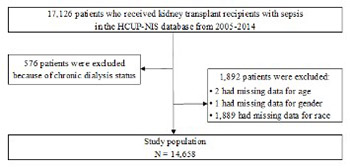Risk factors for complications and graft failure in kidney transplant patients with sepsis
DOI:
https://doi.org/10.17305/bjbms.2018.3874Keywords:
Renal transplantation, sepsis, dialysis, hyperlipidemia, diabetes mellitus, hepatitis CAbstract
Immunosuppressive therapies decrease the incidence of acute kidney rejection after kidney transplantation, but also increase the risk of infections and sepsis. This study aimed to identify the risk factors associated with complications and/or graft failure in kidney transplant patients with sepsis. A total of 14,658 kidney transplant patients with sepsis, identified in the National Inpatient Sample (NIS) database (data from 2005–2014), were included in the study and classified into three groups: patients without complications or graft failure/dialysis (Group 1), patients with complications only (Group 2), and patients with complications and graft failure/dialysis (Group 3). Multinomial logistic regression analyses were conducted to evaluate factors associated with kidney transplant recipients. Multivariate analysis showed that, compared to Group 1, patients from Group 2 or Group 3 were more likely to be Black and to have cytomegalovirus infection, coagulopathy, and glomerulonephritis (p ≤ 0.041). Also, Group 2 was more likely to have herpes simplex virus infection, and Group 3 was more likely to have hepatitis C infection and peripheral vascular disorders, compared to Group 1 (p ≤ 0.002). In addition, patients in Group 3 were more likely to be Black and to have hepatitis C infection, peripheral vascular disorders, coagulopathy, and hypertension compared to Group 2 (p ≤ 0.039). Age and female gender were associated with lower odds of complications after kidney transplantation regardless of graft rejection/dialysis (p ≤ 0.049). Hyperlipidemia and diabetes decreased the chance of complications and graft failure/dialysis after kidney transplant (p < 0.001). In conclusion, the study highlights that black race, male gender, and specific comorbidities can increase the risk of complications and graft failure in kidney transplant patients with sepsis.
Citations
Downloads

Downloads
Additional Files
Published
How to Cite
Accepted 2018-09-16
Published 2019-08-20









